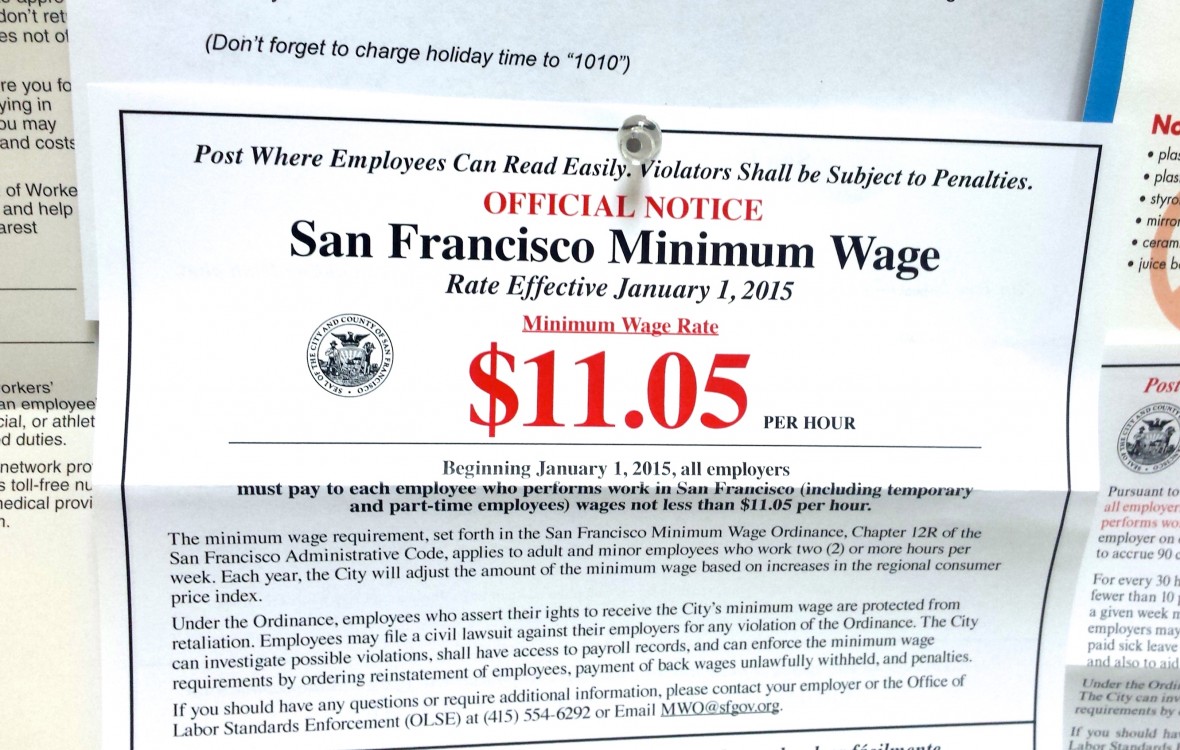
SAN FRANCISCO — In the city at the heart of America’s booming tech sector, steep income inequality exists alongside one of the most powerful regional labor movements in the country. Nowhere is the contrast more pronounced than in San Francisco. The second-most-unequal city in the United States, according to a recent Brookings Institution report, it nonetheless has a union membership rate of 17 percent, well above the national average of 11 percent. And although a massive influx of capital and skyrocketing housing prices have continued to increase inequality, the city’s unions and community labor groups have been largely successful in their efforts to pass labor-friendly wage and scheduling laws.
Two recent labor victories stand out: A ballot initiative gradually raising San Francisco’s minimum wage to $15 per hour and a measure that supporters have labeled the Retail Workers Bill of Rights, which is intended to ensure more full-time work and more consistent work hours for the city’s retail workers.
The minimum wage hike in particular attracted widespread attention. A nationally funded conservative group even posted a billboard in San Francisco warning minimum-wage workers that they would be replaced by iPads if mandatory pay went up to $15. Yet Gordon Mar, the executive director of the labor advocacy group Jobs with Justice San Francisco, said the billboard didn’t seem to make much of a difference in the mostly liberal city.
“There wasn’t much opposition,” he told Al Jazeera. “That’s why it passed so easily, and we didn’t actually have to do much of a field campaign — or much at all.”
In other words, getting the minimum wage raised was the easy part. The bigger challenge for groups like Jobs with Justice and its allies is ensuring that labor legislation has teeth. A higher minimum wage and other labor regulations are not much use if they aren’t enforced, and guaranteeing enforcement is the next big fight, according to Mar.
“This year we’re more focused on making sure strong systems of enforcement are implemented, particularly for the Retail Workers Bill of Rights because that’s a first-of-its-kind policy,” he said.
The Hard Part
Gaps in enforcement are a chronic issue when it comes to labor regulation in San Francisco and elsewhere in the nation. One big reason for that is shortages in staff and funding at enforcement agencies: As of 2011, the Occupational Safety Health Administration — the federal agency in charge of enforcing most workplace safety rules — had the capacity to visit each workplace on average once every 175 years, according to The Guardian newspaper. Statewide, California is facing what the left-leaning National Employment Law Project described in 2013 as a crisis in wage-law enforcement.
On the basis of data collected by California’s Department of Labor Standards Enforcement from 2008 to 2011, the National Employment Law Project determined that workers successfully recovered just 42 percent of lost wages that the enforcement department determined they were owed.
San Francisco addressed the enforcement gap in 2001 by creating the Office of Labor Standards Enforcement (OLSE), dedicated wholly to policing labor standards — the first U.S. city to do so. At its founding, the OLSE was charged with policing a limited number of labor regulations and had just three staff members in charge of enforcement. But the office’s mandate has grown as the city’s Board of Supervisors has passed more workplace regulations.
In addition to the minimum wage increase and the Retail Workers Bill of Rights, the city implemented a paid sick leave ordinance in 2007 and a health care coverage requirement for most employers in 2008. The OLSE has swelled to 20 staffers, but labor activists say even more has to be done to plug the enforcement gap.
Eric Mar, a member of the Board of Supervisors and a brother of Gordon Mar, said he wants to allocate more funding to the OLSE in the city’s next budget.
“We’re very fortunate. I’s a great staff. But they need more staff to be able to monitor the employers and ensure that the Retail Workers Bill of Rights is going to be enforced,” Eric Mar said.
In the meantime, some of the OLSE’s enforcement duties have fallen to organizations outside municipal government. A handful of community groups in San Francisco have received grants from the city to perform outreach, to address allegations of wage theft in their communities and to help workers file wage theft claims.
Those groups include the Filipino Community Center and the Chinese Progressive Association (CPA). The CPA has done worker and community organizing in San Francisco’s Chinatown since the 1970s.
CPA organizing director Shaw San Liu said community groups, because of their local knowledge, are often able to detect cases of wage theft that the OLSE might otherwise miss.
“You have organizations that are already on the ground, have relationships with the community, speak the language, are culturally competent,” she told Al Jazeera. “They’re able to draw on networks of people, to have trust and to reach workers who would otherwise be difficult to reach.”
These groups can also filter the legal work the OLSE has to do, she said, by directly confronting businesses in their communities and giving them a chance to raise wages before workers file a claim.
In November the CPA helped bring to a close one of San Francisco’s highest-profile cases of alleged wage theft in recent memory, in which the group — along with the OLSE, the Asian Law Caucus and others — helped secure a $4 million settlement for workers at the nationally celebrated dim sum restaurant Yank Sing. Liu said that pursuing just a handful of similarly high-profile cases can have a significant deterrent effect.
“Every time there’s a high-profile case, we see things shift,” she said. “We see workers feel more empowered to say, ‘Oh, so there’s actually some answer here. Another worker was able to get their money back.’ That gives people a little bit more confidence and gets people thinking they should come forward too."
3 WAYS TO SHOW YOUR SUPPORT
- Log in to post comments












